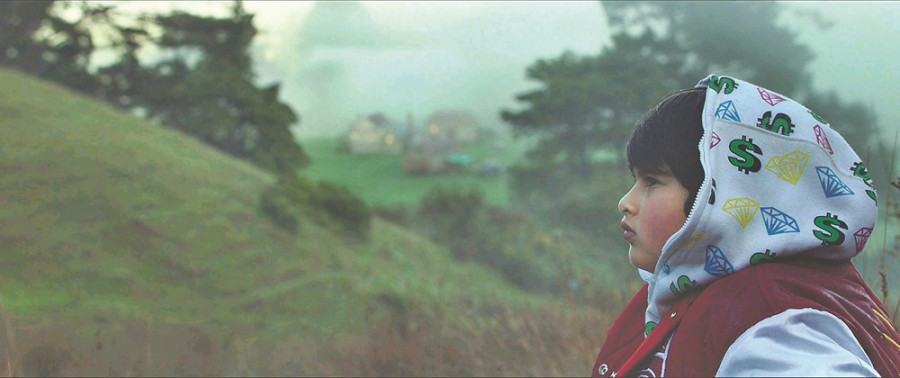Miscellaneous
A jungle out there
Ricky Baker (Julian Dennison) has just met his foster family—comprising the chirpy Aunty Bella (Rima Te Wiata) and the considerably less enthusiastic Uncle Hec (Sam Neill)—and let’s just say, he’s not too impressed.
Obie
Ricky Baker (Julian Dennison) has just met his foster family—comprising the chirpy Aunty Bella (Rima Te Wiata) and the considerably less enthusiastic Uncle Hec (Sam Neill)—and let’s just say, he’s not too impressed. The tubby 12-year-old wannabe-thug from the city with a penchant for gangsta hoodies and sneakers sticks out like a sore thumb in his new rural digs, the patch of farmland somewhere along the edges of the vast and wild New Zealand bush where the couple reside. But, as his social worker (Rachel House) reminds him, this is his last chance to secure a permanent situation: you see, Ricky has gone through a series of foster families in his time, never quite fitting in anywhere, and earning a bit of a reputation as a “bad egg” for misdemeanors ranging from stealing to vandalism to aimless loitering. If this doesn’t work out, then, it’s straight to juvie for ol’ Ricky.
Though he’s anything but keen to begin with, and even tries running away—unsuccessfully, of course, since there isn’t anywhere to run to and he’s hardly equipped to battle the elements on his own—he soon warms up to his new home, thanks in large part to Aunty Bella’s untiring efforts to make him feel wanted and loved. However, just as he’s getting used to having a hot water bottle tucked into his bed every night, (not to mention, seeing the mumsy Bella tackle and slaughter a wild boar with a ludicrously small knife), an unfortunate turn of events throws everything up in the air once again. But Ricky, for the first time in his life, has something he feels is worth fighting for.
I’ve kept things deliberately vague here because I wouldn’t want to detract in any way from anyone’s experience of watching and discovering Taika Waititi’s wonderful Hunt for the Wilderpeople for themselves. Based on Kiwi writer Barry Crump’s young adult book, Wild Pork and Watercress, Wilderpeople is a comedy with heart, an exuberantly absurd coming-of-age tale that effectively surprises, delights and moves. The overall arc of the story might feel fairly familiar, at times a touch too contrived, but plot is ultimately secondary here—the film’s success rests entirely on the efforts of a fantastic cast and generous helpings of quirky humour.
Indeed, Wilderpeople dabbles in that sort of dry, deadpan drollery that you might remember from one of New Zealand’s most popular cultural exports, the comedy/musical TV series Flight of the Conchords, starring Jermaine Clement and Brett McKenzie. The similarities in sensibility are not too surprising, of course, being that Waititi has collaborated many times with the duo in the past, even writing and directing a couple of episodes of Conchords. And Clement and Waititi also co-wrote, co-directed and co-starred in the absolutely hilarious and genuinely bonkers 2014 mockumentary about a circle of vampire-flatmates, What We Do In the Shadows. The distinctive tonal strategy underlying those projects, then, also comes through here—one that revels primarily in offbeat jokes and visual cues, occasionally traipsing into out-and-out farce, a zany rhythm that serves the depiction of the oddballs and oddities that populate the film. And while what we’re seeing is clearly removed from reality, it’s also not so far removed that we can’t identify with the real-world problems that our heroes encounter or worry about the consequences of their actions.
Major props, of course, go to a cast that is able to take on these oddball roles and make them their own, Dennison topmost among them. The young actor, who has been part of a few other local films besides this one, does such a confident job with the material, proffering a convincing blend of arrogance and vulnerability and turning Ricky into a three-dimensional character, rather than just a set of incongruous traits. Te Wiata and Neill are terrific too as our boy’s caretakers, two people with wholly different approaches to the task, but who together give off a definite, wholesome sense of homely stability. And special mention is warranted for Rachel House and Oscar Knightley for their extremely amusing turns here as representatives of a clueless, soulless bureaucracy.
The film also cashes in on the incredible New Zealand locations, forests of lush green and glorious mountain scapes that have been plucked from around the North Island. The travelling sequences that occupy a major chunk of the film’s second half are some of the best-edited—vivid scenery, some fun special effects and all set to a fantastic retro score to boot, including the occasional vintage synthy track, which elevates the visuals, giving the whole experience a charmingly off-kilter vibe. Adding to that are the kooky little title markers that divide the story up into chapters, a device that works to tie the film back to its origins on the page.
There are definitely parts of Wilderpeople that I wish had been left on the cutting room floor—a prolonged scene featuring a young girl on a horse and her over-zealous father is a bit of a strain, for instance—and things do verge on saccharine and clichéd every so often. But, for the most part, Waititi is able to make you forget that you’re treading on familiar ground, by offering up a host of memorable characters and cheery, eccentric wit. The director, who also wrote the initial screenplay for Disney’s newest hit, Moana, is next slated to helm the third Thor movie; he might feel like an unlikely choice for a Marvel film, but if he can bring some of the inventiveness and joy of Wilderpeople to that franchise, we’d owe him big.




 9.7°C Kathmandu
9.7°C Kathmandu










